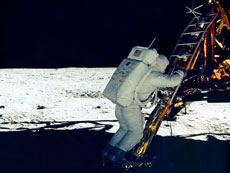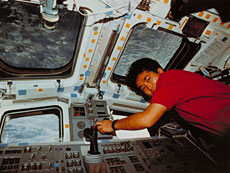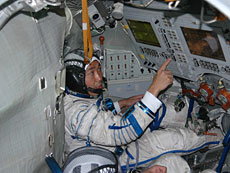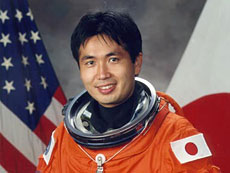
Q. What made you want to be an astronaut?

Apollo 11 moon landing. (Courtesy of NASA)
I think many astronauts had a similar experience, but when I was five years old, I saw the American spaceship Apollo 11 landing on the moon on TV, and I started to long for space. At that time, there weren't any Japanese astronauts, so I didn't think a Japanese person could become an astronaut. I'd had an interest in airplanes since my childhood and later studied to become an aircraft engineer. After finishing my master's degree, I worked for an airline company as an aircraft structural engineer.
That was when I saw an article in a newspaper that the National Space Development Agency (NASDA, now part of JAXA) was recruiting astronauts, and I became interested in how astronauts, a new occupation for Japanese people, were actually selected. At the same time, I recalled my impressions of Apollo 11's landing on the moon when I was five and my desire to travel into space. I was moved to apply to become an astronaut, to take the challenge so I could contribute to the lives of many people around the world.
Q. Is there anything that specifically impressed you about the astronaut selection test?
I still keep in touch with those I got to know during the selection test and I feel I was very lucky to meet all those wonderful people. I experienced many different things, from examinations on academic subjects to medical inspections from head to toe and psychological tests, but what I was strongly impressed by was that right after the medical examinations, during the secondary test, we were each asked to make a plan to escape from a prison and then present the plan to a group of 7-8 applicants. After that, we had to discuss the merits of each plan among the group and come up with a single team plan. None of us who participated in the astronaut selection test had ever experienced an escape from a prison, so it seemed like such a crazy topic. I thought that it was a fair test though, because none of us had experienced this and it required thinking power in a field which was not our specialty. I think it was a very interesting test to evaluate a person’s overall ability, as each person had to show original ideas, make a presentation, debate or give our opinions through group discussions, and take leadership in a harmonious manner to come up with a single group plan.
The most exciting thing for me happened after the candidates’ list was narrowed down to six people. We went to take a psychological test and medical examination at NASA's Johnson Space Center in Houston, and I had the opportunity to meet three real Japanese astronauts, Astronaut Mamoru Mohri, Astronaut Chiaki Mukai, and Astronaut Takao Doi. I even got their autographs!
Q. What do you think has been a good thing about actually becoming an astronaut?

Astronaut Wakata operating the robotic arm on his first flight (STS-72). (Courtesy of NASA)

The road to space flight is long and steep, but I cannot forget the impression I had when I first went to space on the Space Shuttle in 1996 and saw the beautiful blue Earth, like an oasis floating in the pure blackness of space. That was the moment when I strongly felt that I was rewarded for all the training I had gone through. I was really glad then that I had become an astronaut.
I love the work of developing manned space activities in cooperation with many people in the world. With the ISS project, which involves 15 countries, we are not just making space flights with astronauts from various countries, but we are also working closely with other engineers from each country on the development of new space systems, training at each country's facilities, as well as performing experiments and observations in space with the cooperation of many scientists. We need to do a lot of this type of cooperative work among international teams. Beyond the countries, languages, religions, cultures, and customs, astronauts need to open up a common frontier as human beings. An astronaut's work is very satisfying.
Q. I think an astronaut has a lot of psychological stress and undergoes many risks, do you agree? How do you refresh yourself?

Astronaut Wakata participating in Soyuz spaceship training in Russia.
Yes, an astronaut's work comes with great risks. The Columbia accident in 2003, in which the precious lives of our fellow workers were lost, was a big shock to me. On Space Shuttle missions alone, 14 astronauts lost their lives. However, through human space development, we have obtained new knowledge and technologies that have benefited mankind and helped improve our lives on the ground. It is very important to continue manned space development and exploration, and even though the risks can never truly be eliminated, for an astronaut, the risks are worth the rewards.
In our daily lives, sports are very effective in rejuvenating ourselves. As part of our training for the long-duration ISS mission, we have to travel a lot all over the world and sometimes spend long hours in simulator training or doing extra-vehicular activity training. This is often held the day after a long flight traveling, so it is very important to minimize jet lag. For this purpose, I think it is very good to do some kind of sports outside in the sunshine. Generally, I jog outside if the weather permits and lift weights about four times a week. I am banned from playing my beloved baseball starting eight months before the launch, so unfortunately, I can't play baseball right now. I travel to many countries to train for the long-duration ISS expedition, and when I jog in these countries, I sometimes come across interesting scenery that I've never seen before, so this is one of the things I look forward to. While I'm jogging, I can think about various things and new ideas often come to me, so I think jogging is the best way for me to refresh my body and mind.
Communication with my family on the internet or video chatting also gives me great mental support, especially when I'm away from them for training. My family lives in Houston at the moment, which is my training base, but my current routine is to spend half the year in Russia or other countries to train for the expedition mission. I think my family is like an oasis in my daily life. I cherish my time with them.
Q. What do you think are important qualities for astronauts to possess?
The most important quality is a passion to work in space. Even after you are selected to be an astronaut, you don't know how many years it will take before you can go to space. You have to go through a long period of training before you finally go to space, and in addition to that, unexpected accidents can sometimes delay your project. I think it is important to understand not only why you chose this work and what you want to do in space, but to also have a perpetual passion to go to space regardless of how hard the training is and how long it takes.
The indispensable trait in which you make sure you perform your work in space safely is what we call "operational skills" which includes the ability to grasp the situation correctly, perform the work accurately, and communicate exceptionally well. There are very few jobs that can be carried out by only one astronaut, so it is very important to have good team work among astronauts and related workers such as flight controllers in the mission control. Astronauts are required to be respectful and show cooperation as well as leadership.


Q. What are your goals for the future?
Currently, I'm undergoing training for the long-duration ISS expedition scheduled for this winter. I am excited to use my skills gained from 16 years of astronaut experience, including two Space Shuttle flights, and from various training sessions in ISS participating countries. I will try my best to make the ISS project successful. After that, I'd also like to help develop various technologies for the enhancement of Japan's manned space activities. My dream and big goal for the future is to use my experience as an astronaut to help develop a spaceship to launch Japanese or foreign astronauts to space from the Tanegashima Space Center.


Apollo 11 moon landing. (Courtesy of NASA)
That was when I saw an article in a newspaper that the National Space Development Agency (NASDA, now part of JAXA) was recruiting astronauts, and I became interested in how astronauts, a new occupation for Japanese people, were actually selected. At the same time, I recalled my impressions of Apollo 11's landing on the moon when I was five and my desire to travel into space. I was moved to apply to become an astronaut, to take the challenge so I could contribute to the lives of many people around the world.
Q. Is there anything that specifically impressed you about the astronaut selection test?
I still keep in touch with those I got to know during the selection test and I feel I was very lucky to meet all those wonderful people. I experienced many different things, from examinations on academic subjects to medical inspections from head to toe and psychological tests, but what I was strongly impressed by was that right after the medical examinations, during the secondary test, we were each asked to make a plan to escape from a prison and then present the plan to a group of 7-8 applicants. After that, we had to discuss the merits of each plan among the group and come up with a single team plan. None of us who participated in the astronaut selection test had ever experienced an escape from a prison, so it seemed like such a crazy topic. I thought that it was a fair test though, because none of us had experienced this and it required thinking power in a field which was not our specialty. I think it was a very interesting test to evaluate a person’s overall ability, as each person had to show original ideas, make a presentation, debate or give our opinions through group discussions, and take leadership in a harmonious manner to come up with a single group plan.
The most exciting thing for me happened after the candidates’ list was narrowed down to six people. We went to take a psychological test and medical examination at NASA's Johnson Space Center in Houston, and I had the opportunity to meet three real Japanese astronauts, Astronaut Mamoru Mohri, Astronaut Chiaki Mukai, and Astronaut Takao Doi. I even got their autographs!
Q. What do you think has been a good thing about actually becoming an astronaut?

Astronaut Wakata operating the robotic arm on his first flight (STS-72). (Courtesy of NASA)
The road to space flight is long and steep, but I cannot forget the impression I had when I first went to space on the Space Shuttle in 1996 and saw the beautiful blue Earth, like an oasis floating in the pure blackness of space. That was the moment when I strongly felt that I was rewarded for all the training I had gone through. I was really glad then that I had become an astronaut.
I love the work of developing manned space activities in cooperation with many people in the world. With the ISS project, which involves 15 countries, we are not just making space flights with astronauts from various countries, but we are also working closely with other engineers from each country on the development of new space systems, training at each country's facilities, as well as performing experiments and observations in space with the cooperation of many scientists. We need to do a lot of this type of cooperative work among international teams. Beyond the countries, languages, religions, cultures, and customs, astronauts need to open up a common frontier as human beings. An astronaut's work is very satisfying.
Q. I think an astronaut has a lot of psychological stress and undergoes many risks, do you agree? How do you refresh yourself?

Astronaut Wakata participating in Soyuz spaceship training in Russia.
In our daily lives, sports are very effective in rejuvenating ourselves. As part of our training for the long-duration ISS mission, we have to travel a lot all over the world and sometimes spend long hours in simulator training or doing extra-vehicular activity training. This is often held the day after a long flight traveling, so it is very important to minimize jet lag. For this purpose, I think it is very good to do some kind of sports outside in the sunshine. Generally, I jog outside if the weather permits and lift weights about four times a week. I am banned from playing my beloved baseball starting eight months before the launch, so unfortunately, I can't play baseball right now. I travel to many countries to train for the long-duration ISS expedition, and when I jog in these countries, I sometimes come across interesting scenery that I've never seen before, so this is one of the things I look forward to. While I'm jogging, I can think about various things and new ideas often come to me, so I think jogging is the best way for me to refresh my body and mind.
Communication with my family on the internet or video chatting also gives me great mental support, especially when I'm away from them for training. My family lives in Houston at the moment, which is my training base, but my current routine is to spend half the year in Russia or other countries to train for the expedition mission. I think my family is like an oasis in my daily life. I cherish my time with them.
Q. What do you think are important qualities for astronauts to possess?
The most important quality is a passion to work in space. Even after you are selected to be an astronaut, you don't know how many years it will take before you can go to space. You have to go through a long period of training before you finally go to space, and in addition to that, unexpected accidents can sometimes delay your project. I think it is important to understand not only why you chose this work and what you want to do in space, but to also have a perpetual passion to go to space regardless of how hard the training is and how long it takes.
The indispensable trait in which you make sure you perform your work in space safely is what we call "operational skills" which includes the ability to grasp the situation correctly, perform the work accurately, and communicate exceptionally well. There are very few jobs that can be carried out by only one astronaut, so it is very important to have good team work among astronauts and related workers such as flight controllers in the mission control. Astronauts are required to be respectful and show cooperation as well as leadership.

Q. What are your goals for the future?
Currently, I'm undergoing training for the long-duration ISS expedition scheduled for this winter. I am excited to use my skills gained from 16 years of astronaut experience, including two Space Shuttle flights, and from various training sessions in ISS participating countries. I will try my best to make the ISS project successful. After that, I'd also like to help develop various technologies for the enhancement of Japan's manned space activities. My dream and big goal for the future is to use my experience as an astronaut to help develop a spaceship to launch Japanese or foreign astronauts to space from the Tanegashima Space Center.
Dr. Koichi Wakata
Astronaut with the Space Technology and Astronauts Department of JAXA Human Space Systems and the Utilization Mission Directorate.
Dr. Wakata received a Ph.D. in Aerospace Engineering from Kyushu University. He joined Japan Airlines in 1989 and was engaged in the involved in multiple research and engineering projects in the fields of structural integrity of transport aircraft. In 1992, he was selected as a Mission Specialist (MS) candidate with NASDA (now part of JAXA) for the assembly and operation of the JEM Kibo on the International Space Station and participated in the 14th NASA astronaut training course at the Johnson Space Center in Houston, TX.. After one year of training, Dr. Wakata was certified as an MS by NASA. In 1996, he went to space on the STS-72 Space Shuttle mission as the first Japanese Mission Specialist. In 2000, Dr. Wakata again traveled on the Space Shuttle on the ISS assembly mission STS-92 as an MS and was the first Japanese astronaut to participate in the construction of the ISS. In 2007, he was assigned as a flight engineer to ISS Expedition 18 scheduled to begin in early 2009.
Astronaut with the Space Technology and Astronauts Department of JAXA Human Space Systems and the Utilization Mission Directorate.
Dr. Wakata received a Ph.D. in Aerospace Engineering from Kyushu University. He joined Japan Airlines in 1989 and was engaged in the involved in multiple research and engineering projects in the fields of structural integrity of transport aircraft. In 1992, he was selected as a Mission Specialist (MS) candidate with NASDA (now part of JAXA) for the assembly and operation of the JEM Kibo on the International Space Station and participated in the 14th NASA astronaut training course at the Johnson Space Center in Houston, TX.. After one year of training, Dr. Wakata was certified as an MS by NASA. In 1996, he went to space on the STS-72 Space Shuttle mission as the first Japanese Mission Specialist. In 2000, Dr. Wakata again traveled on the Space Shuttle on the ISS assembly mission STS-92 as an MS and was the first Japanese astronaut to participate in the construction of the ISS. In 2007, he was assigned as a flight engineer to ISS Expedition 18 scheduled to begin in early 2009.
In Search of the Unknown Frontier
Going to Space as a Representative of Japan
An Intense Passion to Work in Space
Going to Space as a Representative of Japan
An Intense Passion to Work in Space